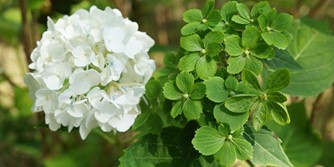Flowers to Leaves: Bacterial Phyllogen Regulates Host Development
By Yugo Kitazawa and Kensaku Maejima, Department of Agricultural and Environmental Biology, Graduate School of Agricultural and Life Sciences, The University of Tokyo
Background: Phyllogens are a protein family conserved among phytoplasmas, a group of plant pathogenic bacteria. Phyllogens transform flowers into leaves by interacting with and inducing degradation of host proteins required for flower development, such as MADS-domain transcription factors (MTFs). Phyllogen utilizes the proteasome, a protein degradation system of host plants that usually degrades proteins in two steps: First, ubiquitin is conjugated to proteins as a degradation tag. Then, the ubiquitinated proteins interact with the proteasome, either directly or with the help of shuttle proteins that transport ubiquitinated proteins to the proteasome. Several bacterial proteins utilize the proteasome by conjugating ubiquitin to their target proteins. On the contrary, phyllogen binds to the shuttle protein RAD23 directly. Here, we examined the interaction between phyllogen, MTF, and RAD23 simultaneously in Nicotiana benthamiana leaves.
Questions: The main question is: What is the precise molecular mechanism of phyllogen-mediated MTF degradation? Also, what is the importance of ubiquitin in the phyllogen-mediated MTF degradation?

Model of the interaction between phyllogen and host factors.
Findings: Our localization and immunoprecipitation analyses with phyllogen, MTF, and RAD23 showed that phyllogen mediated the interaction between MTF and RAD23. Ubiquitination of phyllogen, but not MTF, was observed in the immunoprecipitation. We also confirmed that phyllogen could work independently of ubiquitination. Moreover, immunoprecipitation assays using purified phyllogen, MTF, and RAD23 showed that phyllogen mediated the interaction between MTF and RAD23 without requiring ubiquitin or other proteins. Phyllogen acted as a mediator between targets and shuttle proteins instead of ubiquitin. Thus, we concluded that phyllogen induced proteasome-dependent but ubiquitin-independent degradation of MTFs by functionally mimicking ubiquitin, demonstrating a unique mechanism for bacterial utilization of the host proteasome.
Next steps: Unlike most proteasome-utilizing bacterial proteins, phyllogen and another recently reported phytoplasma protein (SAP05) function independently of ubiquitin. It is fascinating to consider that this novel proteasome utilization may be a common feature of phytoplasma proteins.
Yugo Kitazawa, Nozomu Iwabuchi, Kensaku Maejima, Momoka Sasano, Oki Matsumoto, Hiroaki Koinuma, Ryosuke Tokuda, Masato Suzuki, Kenro Oshima, Shigetou Namba, Yasuyuki Yamaji. (2022). A phytoplasma effector acts as a ubiquitin-like mediator between floral MADS-box proteins and proteasome shuttle proteins. Plant Cell. https://doi.org/10.1093/plcell/koac062




